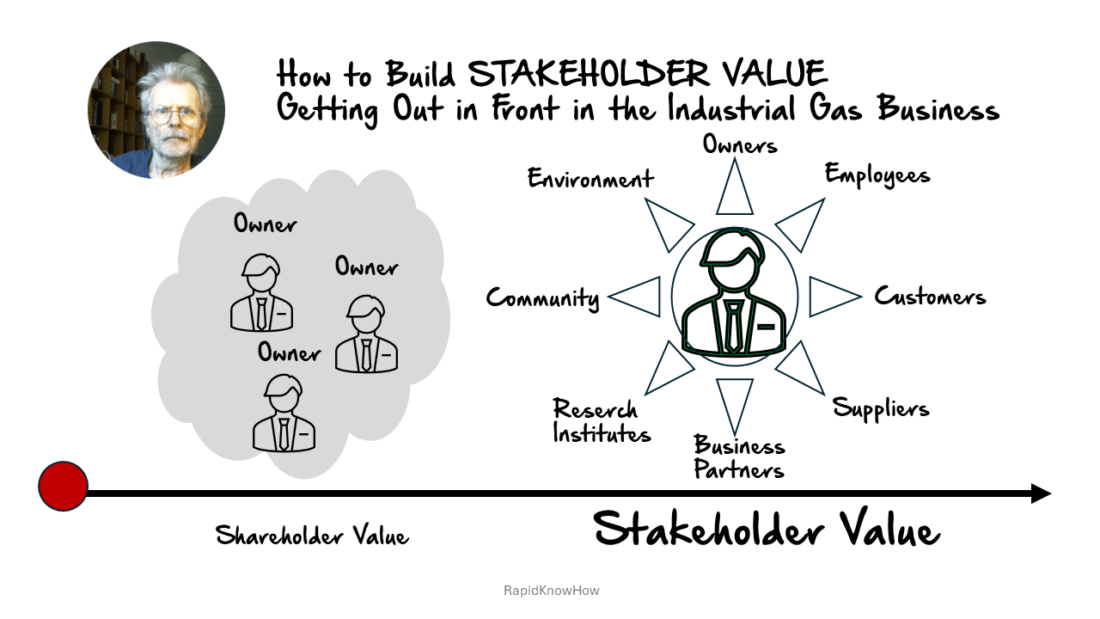The concept of stakeholder value is a critical aspect of modern business strategy, particularly in industries such as industrial gases where the impact of operations extends beyond the immediate shareholders. To fully understand this concept, it’s essential to compare it with shareholder value, explore its pros and cons, and delve into why generating stakeholder value is crucial. We will also identify the stakeholder value leader in the industrial gas industry, discuss their strategies, and explain how stakeholder value is measured.
Comparing Shareholder Value with Stakeholder Value
Shareholder value refers to the financial worth investors derive from owning shares in a company. It’s typically measured by share price and dividends. The primary goal here is to maximise returns for shareholders.
On the other hand, stakeholder value considers a broader spectrum of individuals and entities that have an interest in the company’s operations. This includes employees, customers, suppliers, communities, and even the environment. The aim here is to create value for all these parties without compromising on profitability.
Pros and Cons of Both Concepts
Shareholder value has its merits. It provides a clear focus on financial performance and return on investment, which can drive efficiency and profitability. However, it can also lead to short-termism if companies prioritise immediate returns over long-term sustainability.
Stakeholder value offers a more holistic approach. It encourages companies to consider their social responsibility and long-term sustainability. However, balancing the needs of various stakeholders can be challenging and may not always result in immediate financial gains.
Why Generate Stakeholder Value?
Generating stakeholder value is crucial for several reasons. Firstly, it promotes sustainable business practices that consider social and environmental impacts. Secondly, it can enhance a company’s reputation and relationships with its stakeholders, leading to increased customer loyalty, employee satisfaction, and community support. Lastly, it can lead to long-term financial success as companies that prioritise stakeholder value often enjoy sustainable growth and profitability.
Who is the Stakeholder Value Leader in the Industrial Gas Industry?
In the industrial gas industry, Linde PLC stands out as a leader in generating stakeholder value. The company has a robust strategy that balances the needs of its shareholders, employees, customers, and the environment.
Which Strategies Does the Stakeholder Leader Apply?
Linde PLC applies several strategies to generate stakeholder value. These include investing in employee development, maintaining high safety standards, providing quality products and services to customers, and implementing environmentally friendly practices. The company also engages with local communities and supports various social initiatives.
How is Stakeholder Value Measured?
Measuring stakeholder value can be complex as it involves both tangible and intangible factors. Tangible measures include financial metrics like revenue growth and profitability. Intangible measures involve assessing customer satisfaction, employee engagement, environmental impact, and community relations. Companies often use surveys, feedback mechanisms, and sustainability reports to measure these aspects.
Conclusion
In conclusion, while shareholder value remains an important business consideration, the shift towards stakeholder value is becoming increasingly prominent in industries like industrial gases. Companies that successfully balance the needs of their various stakeholders not only contribute positively to society but also position themselves for long-term success. As demonstrated by Linde PLC, a strategic approach to generating stakeholder value can lead to sustainable growth and profitability.




